
Edvard Munch Painting Reproductions 1 of 1
1863-1944
Norwegian Symbolist/Expressionist Painter
Edvard Munch stands as a solitary figure on the precipice of modern art, his work a haunting echo of the human psyche's deepest chambers. Born on December 12, 1863, in the modest village of Löten, Norway, Munch was no stranger to the shadows that would later pervade his canvases. The grip of illness tightened early around his family: his mother succumbed to tuberculosis when he was just five, and his sister followed at fourteen. These personal tragedies carved indelible marks on his soul, fueling a lifelong exploration of suffering and existential angst.
Without the anchor of formal training, Munch found his footing among the bohemian circles of Kristiania (now Oslo), where writers and artists challenged the suffocating norms of their time. Influenced by the likes of Gauguin and Toulouse-Lautrec, he moved beyond mere representation, seeking instead to give form to inner turmoil and emotional landscapes. His style, crystallized by 1892, abandoned the polished finish of his contemporaries in favor of raw, flowing lines that bared the nervous energy beneath the surface.
That same year, his exhibition in Berlin ignited a firestorm. Critics recoiled at his candid portrayals of sexuality and despair, denouncing his work as unfinished and offensive. Yet, controversy only amplified his voice. Munch became a sensation across Germany, his art resonating with those who sensed the undercurrents of a rapidly changing world.
Central to Munch's legacy is his "Frieze of Life," a series delving into the cycles of love and death. In "The Kiss," lovers meld into a single form, their identities dissolving in the throes of passion. "Madonna" presents a woman caught between ecstasy and melancholy, her closed eyes hinting at realms beyond the physical. Then there is "The Scream" - perhaps his most iconic work - capturing a figure engulfed by a scream that seems to emanate from nature itself. It's a visceral portrayal of anxiety that transcends time, touching on universal fears of isolation and meaninglessness.
Munch's ventures into printmaking further expanded his reach. His etchings and woodcuts, innovative in technique, allowed him to disseminate his haunting imagery to a broader audience. The grain of the wood became an active participant in his compositions, adding texture and depth to his explorations of the human condition.
A nervous breakdown in 1908 marked a turning point. While his later works softened, embracing more extroverted themes, they never lost the introspective thread that defined his earlier pieces. Settling in Norway by 1910, Munch continued to paint, his later years marked by a quiet contemplation of life and nature.
When he passed away on January 23, 1944, at his estate in Ekely near Oslo, Munch left a vast collection to the city. The Munch Museum now stands as a monument to his enduring impact. His art, steeped in personal pain yet reaching toward universal truths, remains a profound commentary on the human experience in the face of an ever-shifting world.
Without the anchor of formal training, Munch found his footing among the bohemian circles of Kristiania (now Oslo), where writers and artists challenged the suffocating norms of their time. Influenced by the likes of Gauguin and Toulouse-Lautrec, he moved beyond mere representation, seeking instead to give form to inner turmoil and emotional landscapes. His style, crystallized by 1892, abandoned the polished finish of his contemporaries in favor of raw, flowing lines that bared the nervous energy beneath the surface.
That same year, his exhibition in Berlin ignited a firestorm. Critics recoiled at his candid portrayals of sexuality and despair, denouncing his work as unfinished and offensive. Yet, controversy only amplified his voice. Munch became a sensation across Germany, his art resonating with those who sensed the undercurrents of a rapidly changing world.
Central to Munch's legacy is his "Frieze of Life," a series delving into the cycles of love and death. In "The Kiss," lovers meld into a single form, their identities dissolving in the throes of passion. "Madonna" presents a woman caught between ecstasy and melancholy, her closed eyes hinting at realms beyond the physical. Then there is "The Scream" - perhaps his most iconic work - capturing a figure engulfed by a scream that seems to emanate from nature itself. It's a visceral portrayal of anxiety that transcends time, touching on universal fears of isolation and meaninglessness.
Munch's ventures into printmaking further expanded his reach. His etchings and woodcuts, innovative in technique, allowed him to disseminate his haunting imagery to a broader audience. The grain of the wood became an active participant in his compositions, adding texture and depth to his explorations of the human condition.
A nervous breakdown in 1908 marked a turning point. While his later works softened, embracing more extroverted themes, they never lost the introspective thread that defined his earlier pieces. Settling in Norway by 1910, Munch continued to paint, his later years marked by a quiet contemplation of life and nature.
When he passed away on January 23, 1944, at his estate in Ekely near Oslo, Munch left a vast collection to the city. The Munch Museum now stands as a monument to his enduring impact. His art, steeped in personal pain yet reaching toward universal truths, remains a profound commentary on the human experience in the face of an ever-shifting world.
6 Edvard Munch Paintings
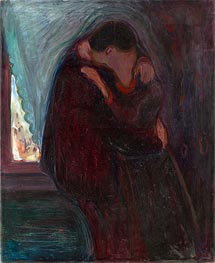
The Kiss 1897
Oil Painting
$636
$636
Canvas Print
$76.84
$76.84
SKU: MUN-16464
Edvard Munch
Original Size: 99 x 81 cm
Munch Museum, Tøyen, Norway
Edvard Munch
Original Size: 99 x 81 cm
Munch Museum, Tøyen, Norway
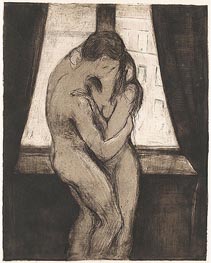
The Kiss 1895
Paper Art Print
$58.82
$58.82
SKU: MUN-16465
Edvard Munch
Original Size: 34.7 x 27.6 cm
Staatsgalerie, Stuttgart, Germany
Edvard Munch
Original Size: 34.7 x 27.6 cm
Staatsgalerie, Stuttgart, Germany
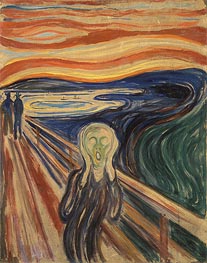
The Scream 1910
Oil Painting
$679
$679
Canvas Print
$74.10
$74.10
SKU: MUN-16482
Edvard Munch
Original Size: 83 x 66 cm
Public Collection
Edvard Munch
Original Size: 83 x 66 cm
Public Collection
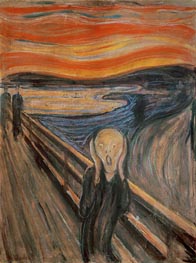
The Scream 1893
Oil Painting
$685
$685
Canvas Print
$70.34
$70.34
SKU: MUN-16483
Edvard Munch
Original Size: 91 x 68 cm
Nasjonalgalleriet, Oslo, Norway
Edvard Munch
Original Size: 91 x 68 cm
Nasjonalgalleriet, Oslo, Norway
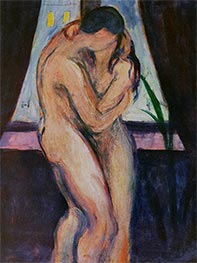
The Kiss c.1896/97
Oil Painting
$503
$503
SKU: MUN-17345
Edvard Munch
Original Size: 38.5 x 31 cm
Private Collection
Edvard Munch
Original Size: 38.5 x 31 cm
Private Collection
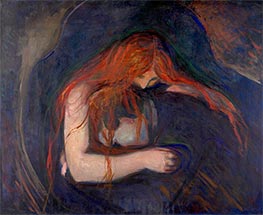
Vampire 1895
Oil Painting
$638
$638
Canvas Print
$77.02
$77.02
SKU: MUN-17346
Edvard Munch
Original Size: 91 x 109 cm
Munch Museum, Tøyen, Norway
Edvard Munch
Original Size: 91 x 109 cm
Munch Museum, Tøyen, Norway